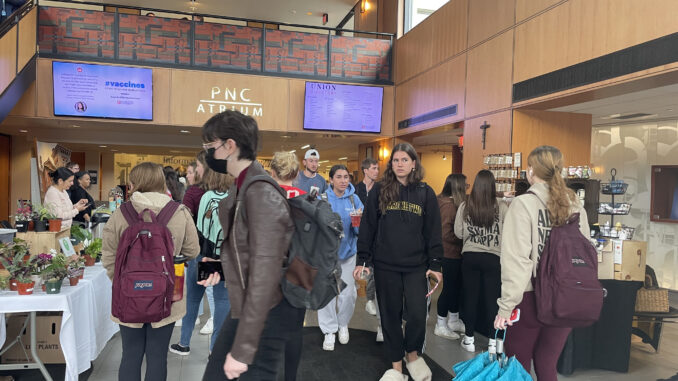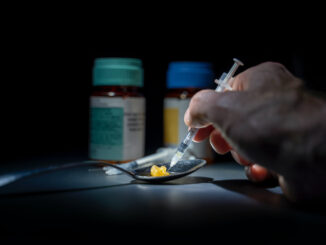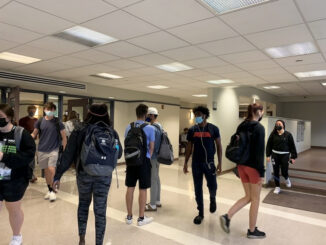
by Luke Henne | sports editor
March 24, 2022
After a March 4 announcement stating that Duquesne’s mask mandate was likely coming to an end, the university officially dropped the restriction on Monday.
In a release sent to students and faculty on March 17, President Ken Gormley said that because Covid-19 transmission levels are low – both on campus and in the region as a whole – the university will no longer require masks to be worn in indoor settings for the first time since Covid began sweeping across the nation over two years ago.
“I’ve been informed by our Health Services professionals that the testing following spring break has yielded no positive cases, either in symptomatic individuals for whom cold or flu was the source of symptoms or in surveillance testing of asymptomatic individuals,” Gormley said in the release.
Elizabeth Solenday, a junior majoring in early childhood education, feels that it’s the right time to make masks optional and that the move is a great decision by the university.
“If vaccines were not mandated, I may have a different opinion, but I feel more comfortable knowing that the vast majority of the campus community is vaccinated,” Solenday said.
When the mandate was dropped on Monday, Solenday said that it felt like the campus community “was able to take a deep breath.”
“Having connection with our classmates and community without masks is both an odd, yet exciting, feeling,” Solenday said. “I believe that excitement is felt across campus.”
Masks will not disappear completely, however.
Exceptions to the lifting of the requirement could occur “in cases where individual faculty members decide to require masks in classes based on safety in the context of class needs for interaction in a limited physical space or other specific concerns related to conducting their own classes.”
Nonetheless, students and faculty are afforded the individual choice to wear a mask. Gormley asked that people respect each person’s individual choice to wear a mask or not.
Some students like Wyatt Van Dyke, a sophomore double majoring in sports information and media alongside sociology, are still choosing to wear a mask, for now.
“I’m still continuing to wear one, at least for a little bit, because I myself am mildly immunodeficient,” Van Dyke said.
He acknowledged, however, that he feels indifferent to the university’s decision.
“Covid seems to be on a relative downturn,” Van Dyke said. “And with it getting to be warmer outside, it’s not a prime time of the year for transmission.”
He also feels that the student body is happy with the university’s decision.
“[I] wouldn’t say the Duquesne student populace was great at wearing them to begin with,” Van Dyke said. “So I get why there’s excitement about the mandate being lifted.”
Solenday and Van Dyke both said that, so far, none of their professors have mandated mask wearing in classrooms and are, ultimately, leaving the choice up to students.
In the release, Gormley said that the university could reimplement a mask requirement if there is a dramatic shift in circumstances, or if Allegheny County alters its policies.
“For the remainder of the semester, we will be in regular contact with local and state health officials,” Gormley said. “The university’s Health & Safety Committee will follow available data to advise if any policy changes are needed due to increased transmission rates of the emergence of any sufficiently threatening variant.”
Jennifer Hamann, a second-year Ph.D. student in the university’s clinical psychology department who also teaches an introductory psychology course, said that she’s in support of the university’s choice.
“I especially feel comfortable with this decision because I know that many, if not all, of my students are vaccinated, aside from those who have a legitimate exemption,” Hamann said.
Hamann said that her department “follows what the higher-ups suggest” in relation to keeping a department-wide requirement in place, adding that she will not require masks in her classrooms.
She cited the Center for Disease Control recent guidance surrounding masking and relieving student anxiety as two main reasons.
“Many of my own clients at the clinic have reported increased anxiety surrounding Covid in general,” Hamann said. “The recent decision to stop the mask mandate at Duquesne will likely ease anxiety and stress for students, staff and faculty.”
However, Hamann hopes that people won’t be excluded for the individual choice they make.
“I support students who still feel comfortable wearing one [a mask], and I hope that they do not feel singled out or intimidated by others who choose not to,” Hamann said.
In the announcement, Gormley encouraged unvaccinated and vulnerable individuals to continue wearing masks, while also saying that the campus community has “come quite a long way to arrive at this point.”
“It’s wonderful to be able to relax some protections and finish the academic year on a more positive note – something we’ve hoped would happen for a long time,” Gormley said. “I’m reminded yet again of the power of our Duquesne community when we work together to overcome the adversities that we’ve faced.”



